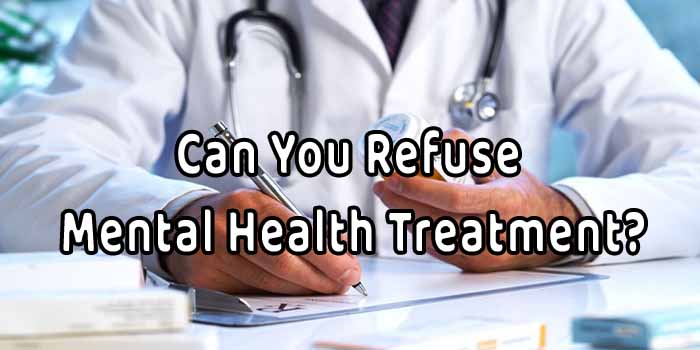Can I Refuse Mental Health Treatment?
Mental health is a journey that is as personal as it is complex. With the growing awareness around mental well-being, questions about the autonomy and rights of individuals seeking or being advised to seek treatment have become more prevalent. One question that often arises is: “Can I refuse mental health treatment?”
Whether you’re considering this for yourself or a loved one, or you’re simply curious about the rights one has over mental health care, this article aims to shed light on this sensitive topic.
Understanding Your Rights
In most cases, adults have the right to refuse medical treatment, including mental health services. This right is protected under the principle of informed consent, which states that you must be fully informed about the treatments being offered and the potential risks and benefits. Only then can you make a voluntary and educated decision about whether to accept or refuse treatment?
However, there are exceptions to this rule, especially when it comes to the safety of the individual or others. If a person is deemed a danger to themselves or someone else, they may be subject to involuntary treatment under specific laws that vary by region.
Can a Minor Refuse Mental Health Treatment?
When it comes to minors, the situation becomes more nuanced. Generally, parents or legal guardians have the right to make decisions about their children’s healthcare. But as minors approach the age of majority, some regions grant them more autonomy over their health decisions, including the refusal of mental health treatment.
It’s important to note that even in these cases if a minor is considered to be in a life-threatening situation or poses a risk to others, similar exceptions for involuntary treatment may apply.

The Importance of Conversation
Refusing mental health treatment is a significant decision that should not be taken lightly. It’s crucial to have open and honest conversations with healthcare professionals, trusted loved ones, and, if applicable, legal advisors. Understanding the full scope of one’s condition, the proposed treatment plan and the potential outcomes of refusing treatment is essential.
Conclusion: Your Health, Your Decision
Mental health treatment is a deeply personal choice, and the decision to accept or refuse treatment should be made with the utmost care and consideration. If you or someone you know is contemplating this decision, it’s important to seek comprehensive information and support.
Remember, while you have the right to refuse treatment, you also have the right to seek a second opinion, ask questions, and be an active participant in your healthcare journey. Your voice matters, and your mental health is paramount.
Can I Refuse Mental Health Treatment?
If you’re looking for more information or need someone to talk to, don’t hesitate to reach out to mental health professionals who can provide guidance tailored to your unique situation.
FAQs About Refusing Mental Health Treatment:
Q: Can I legally refuse mental health treatment?
A: Yes, in many cases, individuals have the legal right to refuse mental health treatment. Laws vary, so it’s essential to understand the regulations in your jurisdiction.
Q: Are there exceptions to the right to refuse treatment?
A: Yes, exceptions may exist in emergencies or if a court deems treatment necessary for the safety of the individual or others.
Q: What is informed consent in mental health treatment?
A: Informed consent is a crucial aspect of the treatment process, ensuring that individuals are fully aware of the potential risks, benefits, and alternatives before making decisions about their care.
Q: Can my decision to refuse treatment be overruled?
A: In emergencies or through legal processes, such as court-ordered treatment, your decision may be overruled if there are significant safety concerns.
Q: How can I communicate my decision to refuse treatment with my healthcare provider?
A: Open communication is key. Be honest with your healthcare provider about your concerns, and work together to explore alternative options that align with your preferences.
Q: What are the consequences of refusing mental health treatment?
A: Consequences may include potential deterioration of mental health, increased risk of crisis, or legal interventions in extreme cases.

Q: Are there alternative approaches to traditional mental health treatment?
A: Yes, alternative approaches may include various therapy modalities, holistic practices, and lifestyle changes. Collaborate with your healthcare provider to find an approach that suits your needs.
Q: How can I actively participate in crafting my treatment plan?
A: Actively engage in discussions with your healthcare provider, share your preferences, and be open to exploring different treatment options that align with your values.
Q: What role do support systems play in the decision to refuse treatment?
A: Support systems, including family, friends, and mental health advocates, can provide guidance, and encouragement, and help individuals make more informed decisions.
Q: Can mental health stigma influence my decision to refuse treatment?
A: Yes, stigma may impact how individuals perceive treatment options. It’s important to be aware of and challenge stigma to make decisions based on personal well-being.
Q: How can mental health advocates assist me in understanding my rights?
A: Mental health advocates can provide information, support, and resources, helping individuals understand their rights and make informed treatment decisions.
Can I Refuse Mental Health Treatment
Q: What resources can I explore for more information on mental health treatment rights?
A: Reliable resources include mental health organizations, legal aid services, and healthcare providers who can offer guidance on your rights and options.
Q: Can I seek a second opinion if I disagree with my current treatment plan?
A: Absolutely. Seeking a second opinion allows you to explore different perspectives and treatment approaches to make informed decisions about your mental health care.
Q: How can I reduce mental health stigma in my community?
A: Promote open conversations, educate others about mental health, and challenge stereotypes. By fostering understanding, you contribute to reducing stigma in your community.
Q: Is there a difference between refusing treatment temporarily and permanently?
A: Yes, some individuals may choose to refuse treatment temporarily while exploring alternative options. Others may make more permanent decisions. It’s a personal choice that should be discussed with healthcare providers.
Can I Refuse Mental Health Treatment
Suggested Posts:
- The Right to Refuse Treatment by Psychiatric Times

